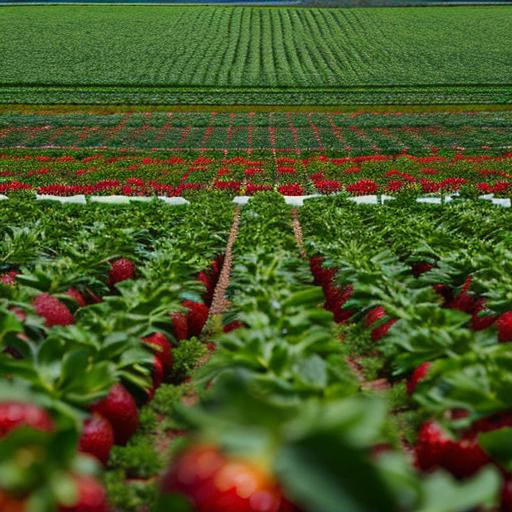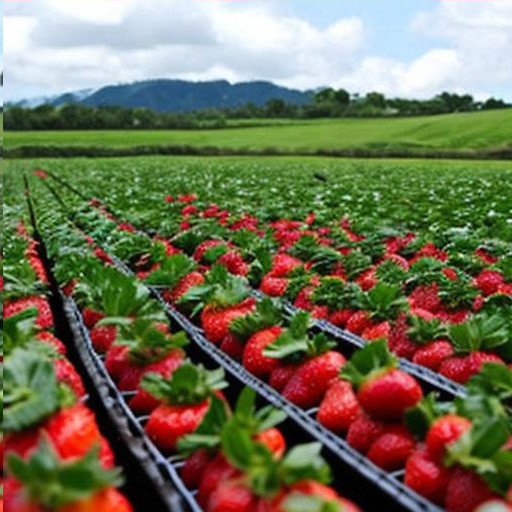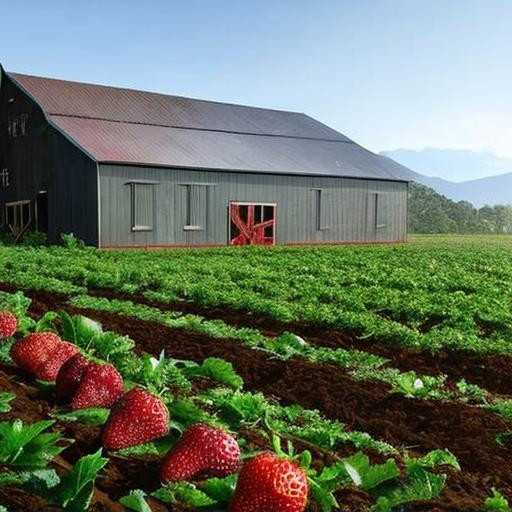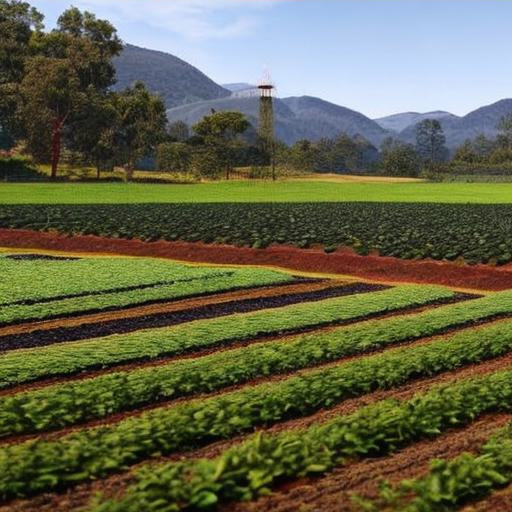

Strawberry farming is the cultivation and production of strawberries as a commercial crop. This involves preparing the soil, selecting and planting the right variety of strawberries, providing proper care and maintenance (e.g. watering, fertilizing, pest control), and harvesting the fruit when it is ripe. Strawberry farming can be done in both traditional and modern methods, such as in open fields or in controlled environments like greenhouses. The goal of strawberry farming is to produce high-quality strawberries for consumption or for use in various food products.
Strawberry farming is a significant agricultural industry in the United States, with California being the largest producer of strawberries in the country. Other states that also have a significant production of strawberries include Florida, Oregon, and Michigan.
In the United States, strawberries are mostly grown using modern farming methods and technologies, such as the use of greenhouses and hydroponic systems, to control the growing environment and improve yields. Strawberry farming in the US also often involves the use of plastic mulch and drip irrigation to conserve water and enhance fruit quality.
The US strawberry industry faces challenges such as labor shortages, competition from imported strawberries, and market fluctuations due to weather conditions and consumer demand. Despite these challenges, the demand for strawberries remains high, and the industry continues to be an important source of income and employment for many farmers and rural communities in the US.

As a business owner in the strawberry farming industry, it's important to have adequate insurance coverage to protect your business from potential risks and liabilities. Some of the insurance coverage options that you may consider include:

Suppose a strawberry farmer in California has a large crop of strawberries that is ready for harvest. The farmer invested a significant amount of money into the crop, including the cost of seeds, labor, and equipment. Suddenly, a hailstorm hits the area and damages a significant portion of the farmer's strawberries. The hailstorm reduces the farmer's expected yield and the quality of the remaining fruit, making it difficult for the farmer to sell the strawberries at a profit.
In this scenario, the farmer would be able to file a claim with their crop insurance provider to receive compensation for their losses. The insurance company would send an adjuster to assess the damage, and the farmer would receive a payment based on the insurance policy's terms and conditions. This payment could help the farmer cover the costs of the damaged strawberries and help mitigate the financial impact of the hailstorm.
Without crop insurance, the farmer would have to bear the entire cost of the damage and could be facing significant financial losses. Crop insurance provides a safety net for farmers and helps protect their investments in the event of natural disasters and other unexpected events.
Here is an example of how liability insurance can help a business owner in the strawberry farming industry:
Suppose a customer visits a strawberry farm in Florida and slips on a wet patch on the ground. The customer sustains a serious injury and requires medical treatment. The customer decides to sue the strawberry farmer for damages, alleging that the farmer was negligent in maintaining a safe environment for visitors.
In this scenario, the farmer's liability insurance policy would provide coverage for the cost of defending the lawsuit and any damages awarded to the customer. The insurance company would appoint a lawyer to represent the farmer and handle the legal case. Without liability insurance, the farmer would have to pay for these costs out of pocket, which could be a significant financial burden.
Liability insurance provides important protection for business owners in the strawberry farming industry, helping them to manage the financial risks associated with accidents or incidents on their property. This coverage can help farmers focus on their business and avoid the stress and uncertainty of facing a lawsuit.
Here is an example of how property insurance can help a business owner in the strawberry farming industry:
Suppose a strawberry farm in Oregon is hit by a severe storm that causes widespread damage to the area. The farmer's greenhouses and storage facilities are damaged by strong winds and heavy rain, and much of the farmer's equipment is destroyed. The farmer estimates the cost of repairs and replacement to be several thousand dollars.
In this scenario, the farmer's property insurance policy would provide coverage for the cost of repairing or replacing the damaged structures and equipment. The farmer would file a claim with their insurance company, and the insurance company would send an adjuster to assess the damage. Based on the assessment, the farmer would receive a payment to cover the cost of repairs or replacement.
Without property insurance, the farmer would have to bear the entire cost of the damage, which could be a significant financial burden. Property insurance provides important protection for business owners in the strawberry farming industry, helping them to manage the financial risks associated with damage to their property and equipment. This coverage can help farmers get back on their feet and continue their operations after a disaster or unexpected event.
Here is an example of how workers' compensation insurance can help a business owner in the strawberry farming industry:
Suppose a worker on a strawberry farm in Washington state is injured while operating a tractor. The worker sustains a serious injury and is unable to work for several weeks. The worker seeks medical treatment and is unable to pay the bills due to lost wages.
In this scenario, the worker's employer, the strawberry farmer, would be responsible for paying the worker's medical expenses and lost wages. However, the cost of these expenses could be significant and could have a significant impact on the farmer's finances.
With workers' compensation insurance in place, the farmer would be able to file a claim with the insurance company to cover the cost of the worker's medical expenses and lost wages. The insurance company would provide coverage for these costs, helping the farmer to manage the financial impact of the worker's injury.
Workers' compensation insurance is required by law in most states for employers who have employees. This insurance provides important protection for both employers and employees, helping to ensure that employees receive the medical treatment and compensation they need in the event of a work-related injury or illness.

Insurance limits and deductibles play an important role in determining the cost and coverage of insurance policies for businesses in the strawberry farming industry.
Insurance limits refer to the maximum amount of money that an insurance company will pay out in the event of a claim. For example, if an insurance policy has a limit of $100,000, the insurance company will only pay up to $100,000 for a covered loss, regardless of the actual cost of the loss. Insurance limits vary by policy and by type of coverage, and they can be adjusted to meet the specific needs of a business.
Deductibles refer to the amount of money that a policyholder must pay out of pocket before the insurance company begins to pay out on a claim. For example, if a policy has a deductible of $1,000 and a covered loss occurs, the policyholder must pay the first $1,000 of the cost of the loss. The insurance company will then pay the remaining amount up to the policy's limit. Deductibles are a way for policyholders to share some of the risk with the insurance company and to lower the cost of their insurance coverage.
In the strawberry farming industry, insurance limits and deductibles can have a significant impact on the cost and coverage of policies. For example, a farmer may choose to have higher insurance limits and a higher deductible to reduce the cost of their insurance coverage, but this would also mean that they would bear a larger share of the risk in the event of a loss. On the other hand, a farmer may choose to have lower insurance limits and a lower deductible to reduce their risk, but this would increase the cost of their insurance coverage.
It's important for business owners in the strawberry farming industry to consider their insurance needs and risks when deciding on insurance limits and deductibles. An insurance agent or broker can help the business owner understand the options and make an informed decision.
Purchasing insurance is always a good idea for businesses, as it helps to manage risks and protect against unexpected events. However, there may be some low-risk businesses in the strawberry farming industry where purchasing insurance might not be necessary or cost-effective. Some examples of such low-risk businesses are:
However, it's important to note that even low-risk businesses can be impacted by unexpected events. It's always advisable to assess the risks associated with a business and consult with an insurance agent or broker to determine the appropriate level of insurance coverage.

In the United States, insurance requirements and state regulations vary by state for the strawberry farming industry. It's important for business owners to understand the insurance requirements and regulations that apply to their operations. Here are a few examples of state requirements:
These are just a few examples of the insurance requirements and regulations that may apply to businesses in the strawberry farming industry in the United States. It's important for business owners to check with their state's insurance department or consult with an insurance agent or broker to determine the specific requirements and regulations that apply to their operations.
Insurance policies have exclusions, which are events or circumstances that are not covered by the policy. Here are a few examples of exclusions that may apply to the strawberry farming industry:
These are just a few examples of the exclusions that may apply to insurance policies in the strawberry farming industry. It's important to carefully review the policy terms and conditions, including the exclusions, to understand what is and is not covered by the policy.

In summary, insurance is an important consideration for businesses in the strawberry farming industry. There are various types of insurance that can help protect against different types of risks, including crop insurance, liability insurance, property insurance, and workers' compensation insurance. The insurance requirements and regulations for businesses in this industry vary by state, and it's important for business owners to understand the specific requirements and regulations that apply to their operations. Additionally, insurance policies typically have exclusions, which are events or circumstances that are not covered by the policy, and it's important to carefully review the policy terms and conditions to understand what is and is not covered.
Last Update: January 2023